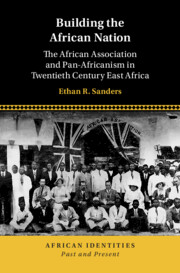Refine search
Actions for selected content:
4 results
Introduction
-
- Book:
- Building the African Nation
- Published online:
- 25 July 2025
- Print publication:
- 14 August 2025, pp 1-38
-
- Chapter
-
- You have access
- HTML
- Export citation
Conclusion
-
- Book:
- Building the African Nation
- Published online:
- 25 July 2025
- Print publication:
- 14 August 2025, pp 293-295
-
- Chapter
- Export citation

Building the African Nation
- The African Association and Pan-Africanism in Twentieth Century East Africa
-
- Published online:
- 25 July 2025
- Print publication:
- 14 August 2025
Introduction
-
- Book:
- New Sudans
- Published online:
- 06 February 2025
- Print publication:
- 13 February 2025, pp 1-28
-
- Chapter
- Export citation
